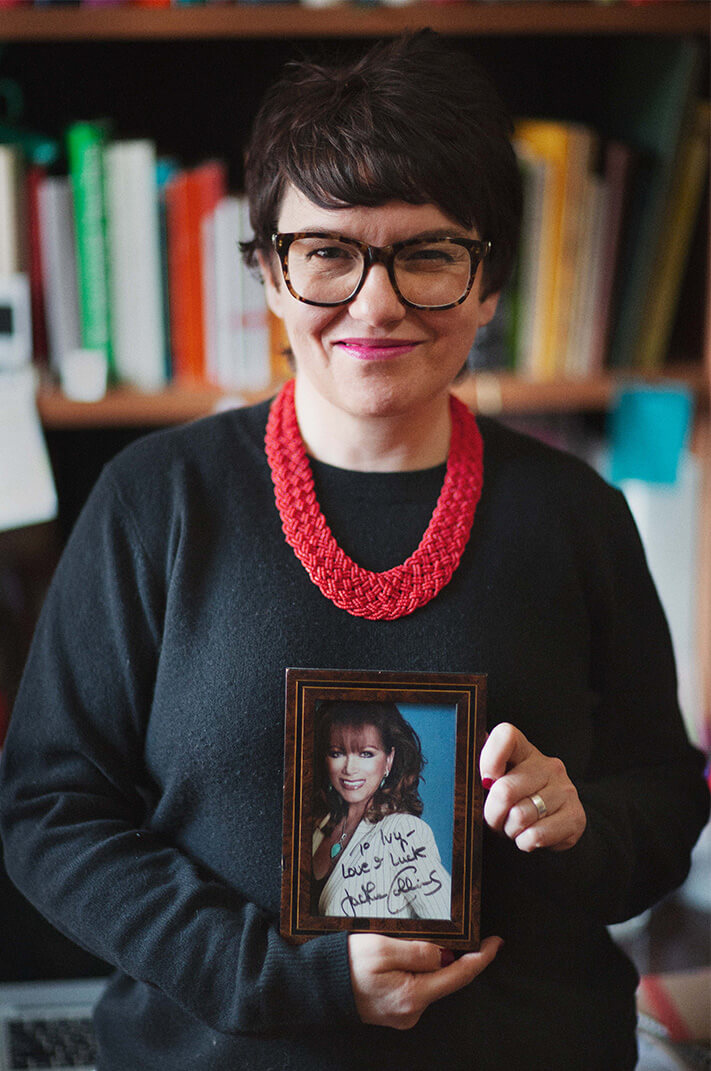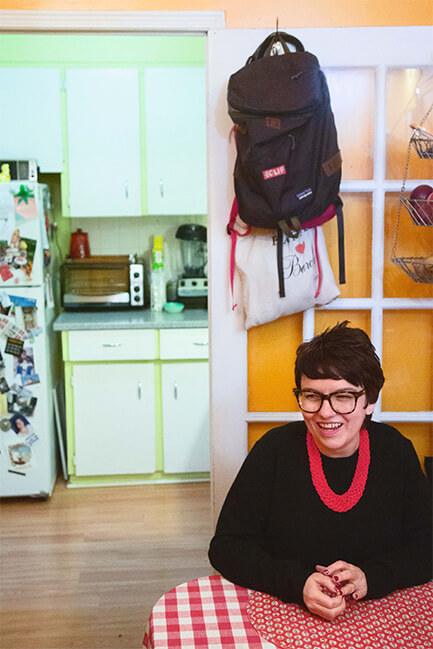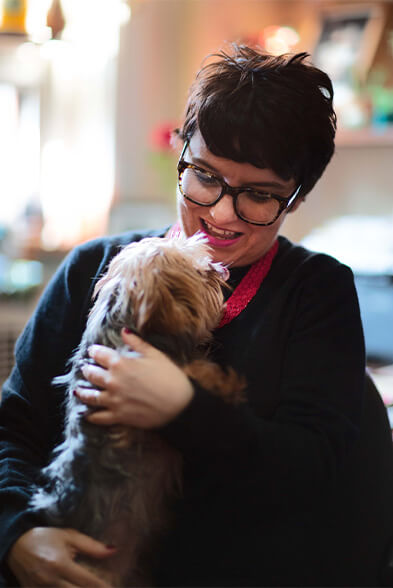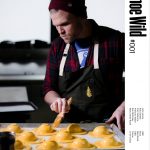Ivy Knight
From dishwasher to food writer: Ivy Knight and the fight to change kitchen culture.
“My name is Ivy Knight, I am a writer, and I used to be a cook…and a dirtbag.”
The way Ivy opened her interview seemed to sum her up perfectly – smart, witty, and incredibly honest. Even the moment we stepped into her home, we knew this was the abode of a unique and creative mind. We could have spent hours looking around and still not taken in every funny print, crochet pillow, or hand crafted bauble. Every turn was a new array of colors and a new insight into who Ivy is.
The journey that led us to be interviewing her in her beautiful home all started when she was 19 years old in British Columbia and looking for money. She began her career as a dishwasher in a fish and chips kitchen, and was soon promoted to a line cook. Standing over a deep fryer for hours on end during the summer months was not the most pleasant experience, and led her to give front-of-house a try to see if it was any more glamorous than the kitchen. She worked as a hostess at White Spot where she met the love of her life (in her words, “the most handsome man in Canada”), and they moved to Texas. She again found herself immersed in the heat of the kitchen when she got a job making pizzas in front of an 800 degree wood burning oven in Austin. The lifestyle was fast-paced and firey, much like Ivy, and when they decided to move to Toronto she realized the kitchen was all she knew.
She managed to land a line-cook position at a respected restaurant, and her experience here would come to define her career and her work. “It was a lot of fun working there, until it wasn’t. That’s where I was physically attacked by my sous chef, and that’s when I learned about the restaurant industry…the reality of it.”
Ivy wanted to speak about the dark side of the kitchen – the side we most often overlook, mainly because it’s “back of house” and “out of sight, out of mind”. Because of the long hours and tight quarters of the kitchen, a sense of camaraderie is built to deal with the stress. Ivy went on to explain: “you are also ripe for being abused or fucked with. And you also make no money, so you really have no power.”
When we referenced her article written years later based on this experience, How Being a Line Cook Ruined Me, she stressed that the abusive side of the kitchen is ingrained. It has always been there because the kitchen typically operates through mentorship. The kind of abuse she was seeing was taught and is what was passed on to the next chef. She stressed that the best thing a chef can do is to break the cycle of teaching this to the next generation, and change the culture.
This story piqued our curiosity of how her transition from line cook to writing happened. We know Ivy is someone who has an opinion, and we wanted to know when she found her voice in the writing world and what inspired her to speak out. For Ivy, this all stemmed from a nightmare service when working at Biff’s Bistro on Front Street, Toronto. It was one of those evenings where everything seemed to go wrong, and by the end of the night had everyone in the kitchen enraged.


Tired and brimming with frustration, the executive chef told her to go home and get all the anger out on paper – to write about the experience. She didn’t end up writing about it that night because, as she explained, “it is very hard to write anything and make it readable when you are really pissed off.” But it did get her to start experimenting with non-fiction, which was something she had never tried before. What really opened her eyes to the possibility of writing was when her chef pointed out that no other food writers in Canada had any cooking experience, and suggested she could write from a cook’s perspective.
Feeling inspired, she put together a portfolio, and started to do her research. She saw James Chatto, a well-known Canadian food writer, was hosting a launch for his new cookbook in the city. Full of ambition and hope, she approached him afterward this event and professed her dream of becoming a food writer. To her surprise, he took her portfolio, read through it and contacted her a few days later. He was intrigued by her work and offered to introduce her to a few editors he knew. As an interloper still trying to figure out what she wanted to do, she saw James as “a celestial being, just saying “here, let me help you.”” To this day Ivy is still immensely grateful for what he did to get her started.
During these early days she continued to cook, because writing didn’t pay and it took a long time to find her true voice. You can tell her kitchen experiences are a big inspiration in her written work, and her passion to speak out about the injustice in this industry, especially towards women, is where she really thrives.
Looking to dig into this, we asked Ivy to tell us about the most empowered she has felt in her career to date. Without much hesitation, she told us that this happened “when a story that I had written came out, and the reaction was exactly the opposite of what I had been expecting”, referring to her most recent article with the Globe and Mail about a renowned Canadian winemaker. For six months Ivy worked with an investigative team at the Globe looking into accusations of harassment and assault against this individual.

“I just assumed that when the story came out, everyone would think that the women were lying, and that I was a bitch with some axe to grind, and that I would be otrisicsed completely, and would maybe have to leave Toronto or go into another line of work. I was thoroughly convinced of that, and I was terrified.”
To Ivy’s surprise, the reaction was “99.9% positive” and the article ended up being the most successful the Globe and Mail had published so far that summer. People were shocked and outraged by the revelations. When she saw that everyone believed the women in a notoriously harassment-filled industry, she knew her hard work had paid off. The LCBO made the decision to pull the wines in question from the shelves because of the story, and the SAQ and other liquor stores across Canada followed suit. To Ivy, this was completely unexpected and exhilarating.
This lasted a few months until the LCBO decided to carry the wine again. “So… that’s what happens. Everyone forgets so quickly”, she said. But then, to Ivy’s delight, someone leaked an LCBO employee memo to her, which stated that staff weren’t allowed to comment on the conflict to customers asking about the wine in store. Again she wrote a story for the Globe, and again she was convinced no one would care because time had passed. But just as before, the response was that of outrage. “People in the industry were so mad, and that was incredible to see.” She later interviewed many chefs in the industry about their thoughts on the situation: “There wasn’t apathy, everybody was really pissed off. So that gives me hope.”

As the interview started to wind down and Ivy’s yorkie pups, Dr. Nut and Fern, were getting antsy, we wrapped up by asking her what impact she wants to have with her career. “If I operated with that kind of lofty thinking I dont think I’d get any work done” she pointed out truthfully. After taking a moment to sit with the question she realized it’s what she’s been doing all along: “If I could make the world of kitchens a fairer place, where people are terrified to abuse their employees, that would be great.”


